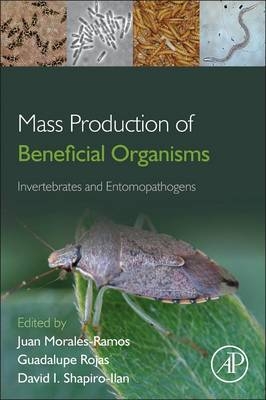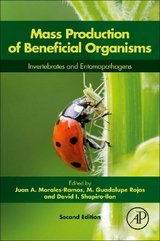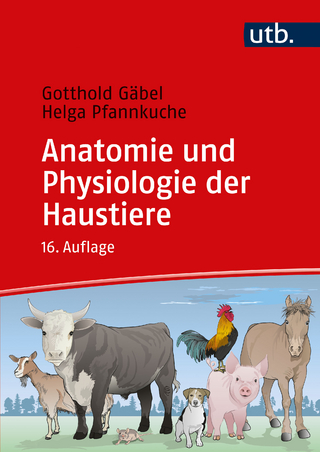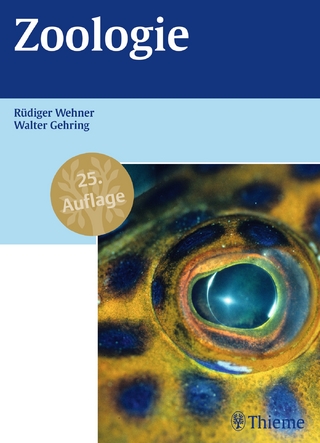
Mass Production of Beneficial Organisms
Academic Press Inc (Verlag)
978-0-12-391453-8 (ISBN)
- Titel erscheint in neuer Auflage
- Artikel merken
Mass Production of Beneficial Organisms: Invertebrates and Entomopathogens is an essential reference and teaching tool for researchers in developed and developing countries working to produce "natural enemies" in biological control and integrated pest management programs.
As we become aware of the negative impact of pesticides in human health and on the environment, interest is rapidly increasing in developing biological pest control alternatives. Tremendous advances have been made in beneficial organism technology, such as insect predators and parasitoids, mite predators, entomopathogenic nematodes, fungi, bacteria, and viruses. However, developing techniques to mass produce these biological control agents is not enough if the cost of commercialization is prohibitive. Advancing mass production to the level of economic feasibility is critical, so these new technologies can compete in the open market.
This book educates academic and industry researchers, and enables further development of mass production so new technologies can compete in the open market. It is also an excellent resource for those researching beneficial arthropod mass production and technologies for other uses, including for study and application in biotechnology and biomedical research.
Dr. Morales’ main expertise is in mass production of arthropods, insect nutritional ecology and thedevelopment of rearing methods and mechanization of rearing processes for beneficial arthropods.Between 1992 and 1998, he developed mass propagation technology for the boll weevil parasitoidCatolaccus grandis. This research earned him the USDA-ARS scientist of the year award in 2002.During 1998 and 2004 he developed termite and ant baiting systems. This research earned him theUSDA-ARS technology transfer award and the Federal Laboratory Consortium regional excellence intechnology transfer award in 2004. Since 2004, he has developed novel rearing methods forpredatory mites and other beneficial arthropods. This included new technology for separation ofmealworm sizes for infection with entomopathogenic nematodes, novel methods for mass producingTenebrio molitor, mechanized methods to pack T. molitor cadavers infected with nematodes, andmechanized methods for infecting T. molitor larvae with entomopathogenic nematodes. The work onthe in-vivo production of entomopathogenic nematodes using T. molitor earn him the NationalFederal laboratory Consortium award of excellence in technology transfer in 2013. Dr. Morales-Ramos has produced a total of 104 publications and 12 patents; his is currently the project leader ofthe project titled “Mass Production of Biological Control Agents. Dr. Morales-Ramos recently editedthe book titled “Mass production of Beneficial Organisms published in January 2014 by Elsevier. Dr. Rojas’ main expertise is in insect nutrition, nutritional ecology and the development of artificialdiets for biological control agents and bait matrixes to control termites and ants. Between 1993 to1998 she developed an artificial diet for the boll weevil parasitoid Catolaccus grandis. Between 1998and 2004, she developed bait matrices for control of the Formosan subterranean termite andhousehold ants, both of which were successfully commercialized by Ensystex and FMC, and still aresold world-wide. This work earned her the USDA-ARS technology transfer award and the FederalLaboratory Consortium regional excellence in technology transfer award in 2004. Since 2004, she hasdeveloped artificial diets for predatory mites and other insect predators and improved susceptibilityof Tenebrio molitor to entomopathogenic nematodes. The work on the in-vivo production ofentomopathogenic nematodes using T. molitor earned her the National Federal laboratory Consortium award of excellence in technology transfer in 2013. Dr. Rojas has produced a total of 99 publications and holds 12 patents, her current responsibilities include principal scientist on 3 different research agreements with 3 different companies including Syngenta Bioline, Kopert, and Monsanto. . Dr. Rojas recently co-edited the book titled “Mass production of Beneficial Organisms published in January 2014 by Elsevier.
Section I: Parasitoids and Predators
Section II: Pathogens
Section III: Arthropods for Other Applications
| Verlagsort | San Diego |
|---|---|
| Sprache | englisch |
| Maße | 152 x 229 mm |
| Gewicht | 1340 g |
| Themenwelt | Naturwissenschaften ► Biologie ► Zoologie |
| ISBN-10 | 0-12-391453-1 / 0123914531 |
| ISBN-13 | 978-0-12-391453-8 / 9780123914538 |
| Zustand | Neuware |
| Informationen gemäß Produktsicherheitsverordnung (GPSR) | |
| Haben Sie eine Frage zum Produkt? |
aus dem Bereich



